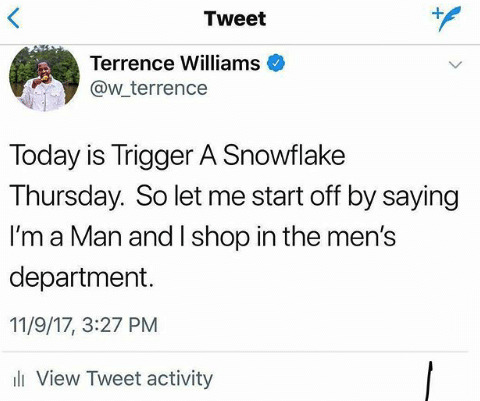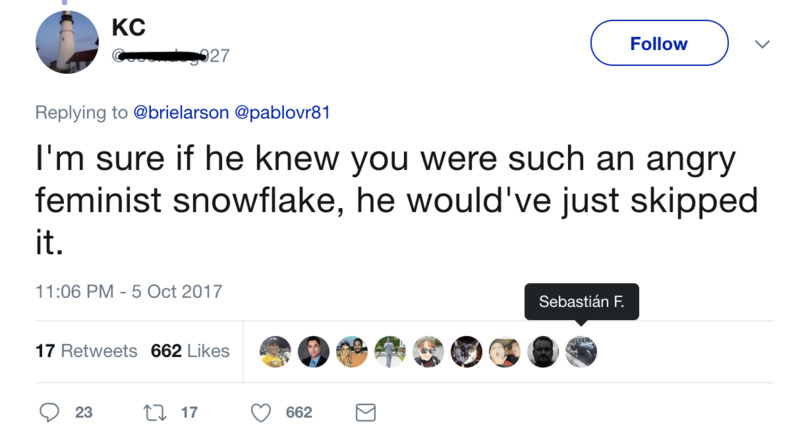The Snowflake: Being Special in the Digital World
The slang term "snowflake" has become a favorite of the internet in recent years as an insult to those who are seen as "too sensitive" or too quick to be offended. In particular, the alt-right community has picked up this term to attack activists and liberal individuals. The vicious connotations that the term has nowadays wasn't always the case. The linguistic evolution that the term went through in recent years can be seen through Urban Dictionary where one of the earlier definitions posted in 2008 was "a person who think they are OMGUNIQUE!, but is, in fact, just like everyone else.” [1]. Still a fairly harsh term, but not nearly as intense as the term is today online. A more recent definition that encapsulated the new connotations the term had gained was a definition posted in 2017 was, "an overly sensitive person, incapable of dealing with any opinions that differ from their own. These people can often be seen lashing out on Twitter when anyone challenges their opinion."[2].
The slang term snowflake grew in popularity around the 2016 American presidential election and the events of Brexit that only encouraged the level of division already occurring due to these movements of conflict and division between conservatives and democrats and the hardship that was Brexit that only worked to further divide individuals. The alt-right individuals that attack feminists with these terms use these terms to encourage a divide in the digital world between what they consider to be acceptable (i.e those who held conservative ideals) and those they consider too sensitive/different (liberal individuals). This divide has only worked to further push these negative ideals of what individuals who work towards feminist goals are like to the outside world and only works to spread misinformation about the movement.
The use of the term snowflake against women to discredit them online has been a major tactic used to silence female voices. Even without any political attachments, women tend to face a disproportionate amount of harassment simply because of the gender of the individual that can negatively affect their online engagement which in turn can adversely affect these individuals' political participation [3]. This digital gender divide only becomes more prevalent when factoring in whether a individual was vocal about their support of the feminist movement and women's rights. A study discussing this very topic found that when presented with a scenario where a woman was receiving abusive comments from her peers after stating an interested in feminism, the majority of respondents (55.86% of 455 students) stated they would not report this incident under the guise of "freedom of speech" [4]. A fascinating discover from this experiment was the gendered difference between the subjects responses where 17.3% of all male participants compared to the 3.6% of all female participants stated they would not report this incident due to it being "freedom of speech" [5]. This statistic underlines the prevalence of network mysognity where those who express support in feminism or woman rights topics (specifically women!) will experience high levels of abuse that will be brushed aside and justified as being "freedom of speech".
References:
[1] Alice. “Snowflake.” Urban Dictionary, 8 Nov. 2008, https://www.urbandictionary.com/define.php?term=Snowflake.
[2] TampaRay. “Snowflake.” Urban Dictionary, 4 Apr. 2017, https://www.urbandictionary.com/define.php?term=Snowflake.
[3] Haslop, Craig, Fiona O’Rourke, and Rosalynd Southern. “#NoSnowflakes: The Toleration of Harassment and an Emergent Gender-Related Digital Divide, in a UK Student Online Culture.” Convergence 27, no. 5 (October 2021): 1418–38. https://doi.org/10.1177/1354856521989270
[4] Haslop, Craig, Fiona O’Rourke, and Rosalynd Southern. “#NoSnowflakes: The Toleration of Harassment and an Emergent Gender-Related Digital Divide, in a UK Student Online Culture.” Convergence 27, no. 5 (October 2021): 1418–38. https://doi.org/10.1177/1354856521989270
[5] Haslop, Craig, Fiona O’Rourke, and Rosalynd Southern. “#NoSnowflakes: The Toleration of Harassment and an Emergent Gender-Related Digital Divide, in a UK Student Online Culture.” Convergence 27, no. 5 (October 2021): 1418–38. https://doi.org/10.1177/1354856521989270


